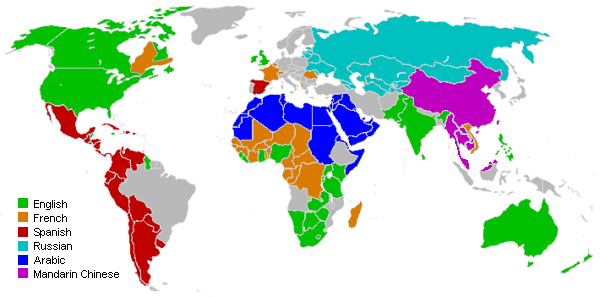English is the major lingua franca—or common language—throughout the planet. But did you know that this “international language” status was never officially decided by an international grouping like the United Nations? In actuality, English is only one of the six official languages of the U.N. So what are those other tongues that share official language status with English?
In Part I of this series, we looked at some of the official languages of the U.N.: Mandarin Chinese, Spanish and French. So now, we shall discuss the remaining two, and then mention some other tongues that might become candidates for additions to the official languages at the U.N.
The next language with official status at the U.N. is, like English, Spanish, and French, within what is known as the Indo-European language family. It’s Russian. Russian is spoken by almost 200 million around the world; most of them live in former the Soviet countries. The biggest of these countries is of course Russia. But countries like Ukraine, Kazakhstan, Belarus, Kyrgyzstan, and many others also use Russian. Even some non-Soviet countries like Israel and Mongolia have many Russian speakers. Other than the fact that it has a large number of speakers, Russian was also chosen because the Soviet Union was a founding member of the U.N. when it was created near the end of World War II.
The final official language of the U.N. is Arabic. Arabic is a main language used by many countries throughout the Middle East and Africa. These countries include Yemen, Saudi Arabia, Jordan, Syria, Egypt, Libya, and Sudan. Some of the African countries that use Arabic are the same ones that also use French, e.g., Mali, Chad, Morocco, and Algeria.
Beyond the six official languages, there has also been some consideration about adding more tongues at the U.N. Two examples of this are Hindi, the main language of India, and Portuguese, which has hundreds of millions of native speakers around the world, but most are in Brazil.
Who knows? If Filipinos keep spreading around the world as OFWs and immigrants, Tagalog can one day become an official language at the United Nations!
At the American Institute for English Proficiency (located in Makati and Quezon City, Philippines), we have had students from many of these countries who speak these languages, and many more.
![]()





